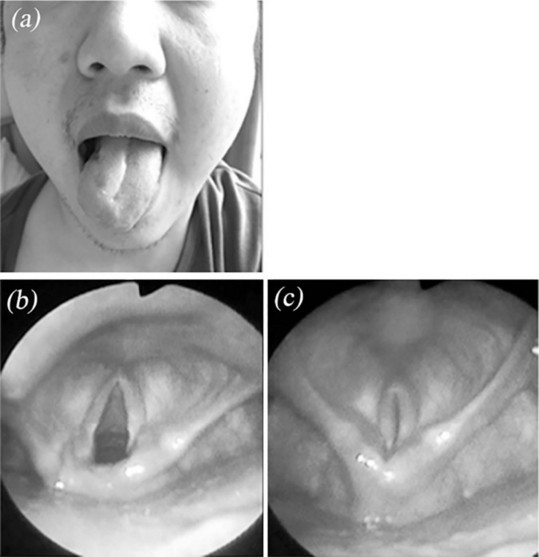Rare. Association of unilateral paralysis of the vocal cords (recurrent nerve) and of the tongue (hypoglossal nerve) with involvement of the pharyngeal branches of the vagus nerve.
This pathology may appear after ipsilateral neck or chest surgery, or after tracheal intubation and is often caused by neuropraxia of these nerves. It is more frequent on the left side and bilateral in 15 % of the cases.
Treatment: in case of neuropraxia: corticosteroids, vitamin B

Image: a) deviation of the tongue to the right when protruded b) paralysis of the right vocal cord at inspiration
c) incomplete closure of the glottis at expiration
Anesthetic implications:
to be kept in mind in case of respiratory difficulties after extubation; Prevention: avoid positioning the cuff of the endotracheal tube too close to the glottis and monitor cuff inflation pressure.
References :
- Turan I, Yildirim ZK, Tan H.
Bilateral Tapia syndrome secondary to oropharyngeal intubation.
J Neurosurg Anesthesiol 2012;24(1):78
- Lopes G, Denoel C, Desuter G, Docquier M-A.
Two cases of isolated unilateral paralysis of hypoglossal nerve after uncomplicated orotracheal intubation.
Acta Anaesthesiol Belg 2009; 60: 191-3.
- Kashyap SA, Patterson AR, Loukota RA, Kelly G.
Tapia's syndrome after repair of a fractured mandible.
Br J Oral Maxillofac Surg. 2010; 48: 53-4
- Ulusoy H, Besir A, Cekic B, Kosucu M, Geze S.
Transient unilateral combined paresis of the hypoglossal nerve and lingual nerve following intubation anesthesia.
Braz J Anesthesiol 2014; 64:124-7
- Brandt L.
Tapia-Syndrom.
Der Anaesthetist 2015; 64: 122-7.
- Kang JH, Dong Min Kim DM, Seok Won Kim SW.
Tapia syndrome after cervical spine surgery.
Korean J Spine 2013 ; 10 :249-51.
- Giordano G, Alessandri F.
Tapia’s syndrome: the devil is in the details.
Minerva Anesthesiologica 2022 (in press)
Updated: march 2022